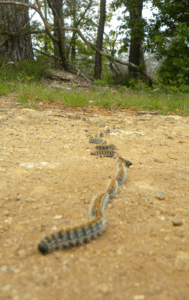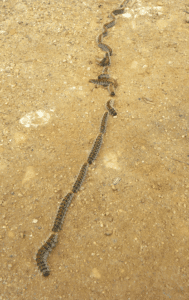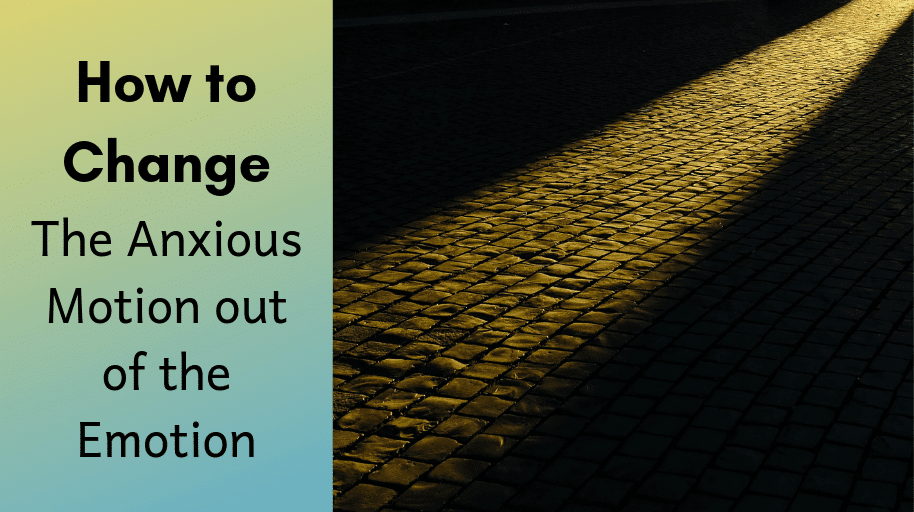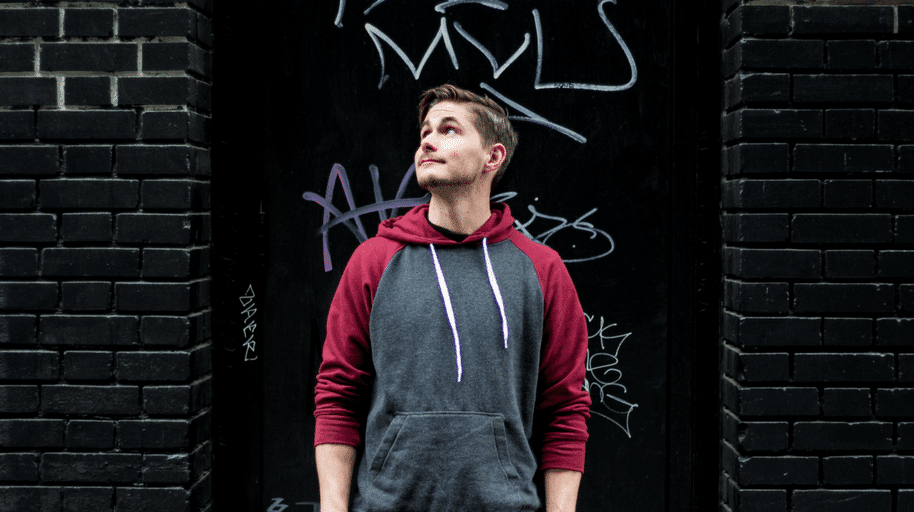How did I get here? Well, it was probably down a well-worn track in your brain that said ‘when you feel this feeling you do this.’ But we can choose new ways of behaving out of our emotions. When you are feeling anxious you can choose a new motion out of the emotion.
Last year when I was walking the Camino de Santiago I looked ahead on the path and saw the strangest thing. It was a thin black line across the trail.
At first, I thought it was a stick, and then, as I got closer, I wondered if it was a thin snake. But as I got right up next to it, I discovered to my surprise that it was a number of caterpillars following closely behind each other.
These little creatures are called pine processionary.
Later on in the day, we shared our discovery with another pilgrim who told us that the caterpillars do this to camouflage themselves against bird attack. They fool birds into thinking they are a snake. Sounded plausible and maybe the birds were frightened off.
But it’s all about pheromones. Following the trail others have left behind to find the way to best feeding grounds. Much like I was doing in following a pathway left by others.
Let’s take this down to what was happening in my brain.
Observation: I saw a dark stick on the road.
Thought: It’s a snake
Emotion: Fear, feeling anxious
Behavior: Avoid
Observation: But it’s very small
Thought: What is it?
Emotion: Puzzlement
Behavior: Move closer
Observation: They are small, furry, and creeping
Thought: It’s a group of caterpillars
Emotion: Amazement, surprise
Behavior: Take photos



Now all of those little movements in my brain happened very quickly, but the fastest were those when I thought it was a snake. I went to self-protection mode in super fast speed.
Emotions lead to motion
The motion came out of the emotion. I felt something – fear – and then I moved to avoid until I got fresh new information.
Recently I read these sentences in my favorite book on the differences between men and women.
The root meaning of word emotion is not “to feel” but “to move.” The ancient Greeks described how emotions “moved behavior.”
The most important part of your emotions is not how they make you feel but what they get you to do.
Emotions send biological action signals to our muscles and organs to prepare us to do something. Why Women Talk and Men Walk. Patricia Love and Steven Stosny
When you’re anxious
Typically when one is anxious, the motion out of the emotion is to have certain behaviors.
We try to control the situation and micro-manage, we ruminate and dig further into worry, we withdraw and hide, we gloss over and minimize our fears, we throw up a ‘happy mask’ and pretend everything is alright.
But notice what Paul, the apostle, writes to some Christ-followers.
Don’t fret or worry. Instead of worrying, pray.
Let petitions and praises shape your worries into prayers, letting God know your concerns.
Before you know it, a sense of God’s wholeness, everything coming together for good, will come and settle you down.
It’s wonderful what happens when Christ displaces worry at the center of your life.
Philippians 4:6-7 The Message
Observation:
Thought:
Emotion: Anxiety, worry
Behaviour (motion out of the emotion): Pray
Involve your closest and best friend in your deepest concerns.
Give thanks for this closeness, this ‘I am with you’ eternal connection.
Ask Christ to ‘displace’ the worry at the center of your life. There is only room for one master in the neural networks of your brain.
How did I get here?
We are all at times prone to rumination, worry, and anxiety, but we can choose whether we stay there or not.
It’s in a moment of reflection, a pause on the trail where we need to ask ourselves some deep but gentle and full of grace questions.
- How did I get to these emotions?
- What was the motion I took out of the emotions?
- Why did I choose that particular motion or behavior out of that emotion or feeling?
- What is an alternative response to the emotion?
- How can I have more of Christ ‘displacing’ (like a bad tenant or a squatter) those old motions/behaviors?
A new awareness
One of the nasty outcomes of living with anxiety is the shutting down of an awareness of the divine.
We want to be control; we demand the outcomes that we want to make us feel safe and ok. We limit the options by which peacefulness can flow. It’s our way or no way.
And we have done this so often that it has become hardwired into our neural networks.
Supernatural goals need
supernatural resources.
Dr. Larry Crabb
When we learn to pray in such a way that invites a supernatural (beyond our control) response, then we begin to open our awareness to ways that Christ might well be entering into the situation.
We begin to see how the wholeness of Christ can displace our fears.
We don’t have to be ruled by our emotions, but through prayer and practice, we can discover the wholeness of Christ displacing the fear and worry.
Quotes to consider
- My feelings may in fact only be leftovers of another time, another place, another person; but have those feelings ever been told that it’s over? (That was then, this is now.) D. Riddell
- To change your emotions, first get control of your thoughts. Ruts of the mind become moods of the heart. David Riddell
- Believing all of my emotions is the shortest way into the loop of insanity. First the truth, then faith in the truth, then the feelings will come around. D. Riddell
- To achieve radical change, I need to call some of my feelings ‘liars’ and choose to side with truth, against my own emotions, until my feelings come around. David Riddell
- I hope it is clear that feelings of guilt, accompanied by anxiety, fear and restlessness, arise from deep within ourselves and are not an accurate gauge of the state of our souls before God. We cannot assume that he [God] feels about us the way we feel about ourselves, unless we love ourselves intensely and freely. Bernard Bush
Questions to answer
- Do you ever ask yourself about your emotional well being the question ‘How did I get here?’
- What would it look like to have the wholeness of Christ to displace your fears?
- What little steps can you make to change the motion out of the emotion?
Further reading
https://turningthepage.co.nz/seven-steps-to-stop-overthinking-and-to-calm-your-anxiety/
Barry Pearman
Photo by Ray Fragapane on Unsplash





